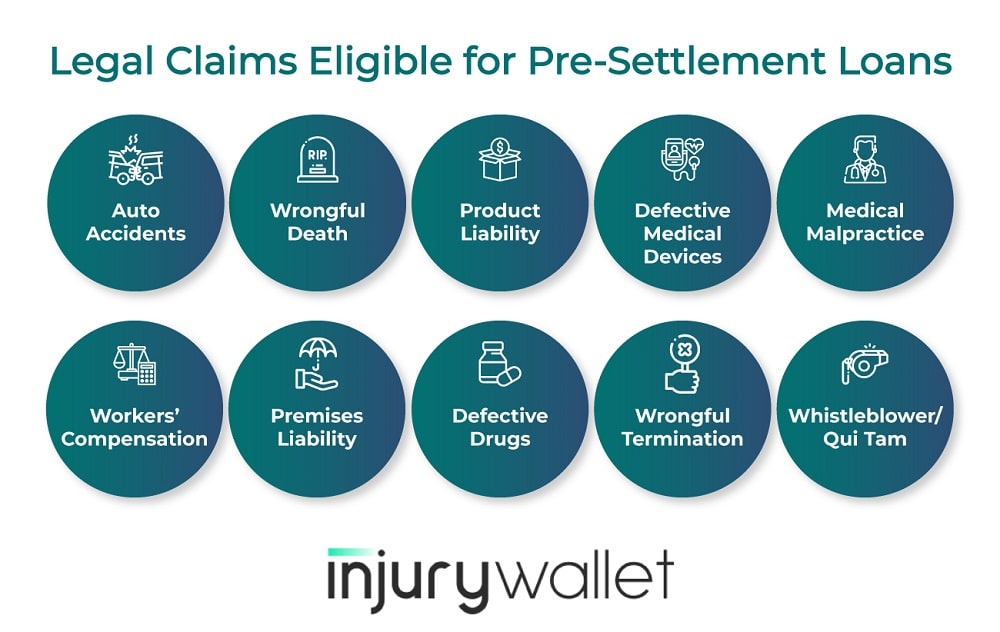Even if you have a rock-solid case and are almost guaranteed to prevail, lawsuits and settlement agreements take time to finalize.
This poses difficulties for individuals who need compensation sooner, rather than later.
Get financial support during a personal injury case by securing a loan against your future settlement.
If you are interested in obtaining a pre-settlement loan for a pending lawsuit, Injury Wallet is prepared to help.
Complete our short form to apply today, and check out our pre-settlement loan FAQs.
1. What Is a Settlement Loan?

A settlement loan, also known as a lawsuit settlement loan, is a financial option that offers upfront cash to individuals awaiting a resolution in their legal case.
Typically, this type of loan is provided to those expecting compensation from a pending settlement award or lawsuit judgment.
It serves as a quick financial solution for individuals involved in legal proceedings, helping them manage expenses while awaiting the finalization of their case.
Bringing a lawsuit is expensive, and settlement loans are a common resolution to offset those added expenses.
There are multiple lawsuit loan companies to choose from when applying for a settlement loan.
Injury Wallet can ease your burdens by guiding as to which top-rated lawsuit loan company fits your needs the best.
2. What Are Other Terms for “Pre-Settlement Loan”?
Settlement loans are referred to in many ways, but all the titles mean the same thing.
Common names for settlement loans include:
- Cash advance,
- Lawsuit loan,
- Settlement loan,
- Settlement advance,
- Loans for settlements,
- Pre-settlement funding, and
- Pre-settlement cash advance.
Despite the different names, the same process applies. Different companies advertising the same products under completely different titles is confusing for consumers.
Injury Wallet eases consumer concerns by finding the top lawsuit lenders in the country and matching you with a lender who has the lowest rate.
3. How Do Pre-Settlement Loans Work?
A settlement loan involves a lender providing funds to settle a legal claim before it goes to court. If you win the case, the loan doesn’t need repayment.
In case of a loss, you’re obligated to repay. Noteworthy: this isn’t a typical loan agreement.
After you file the lawsuit, you apply for a settlement loan with a lawsuit funding company.
The company will evaluate your claim and decide as to how much your settlement would likely be or how much recovery you could expect if you won in court.
The lender will offer you a settlement advance, which are funds available immediately, in exchange for a sum of money and a “funding fee” out of the proceeds of your final settlement or judgment.
4. What Legal Claims Are Eligible For Pre-Settlement Loans?

Only certain legal claims qualify for settlement loans. Notably, eligibility depends on the monetary value and the likelihood of success of your claim.
The cases typically eligible for settlement loans include:
- Personal injury claims,
- Auto accidents,
- Workplace injuries,
- Premises liability,
- Workers’ compensation,
- Medical malpractice,
- Wrongful death, and
- Product liability.
This list is non-exhaustive. Lenders determine eligibility for pre-settlement cash advances on a case-by-case basis. Injury Wallet will help connect you with a legal lending company that fits your needs the best.
5. How Do I Know If I Qualify For Legal Funding?
Qualification for settlement loans hinges on three main factors:
- The likelihood of proving liability;
- The severity of your injuries; and
- Whether you have hired an attorney.
The likelihood of prevailing on your claim is a major concern for lenders. An airtight case is more likely to be eligible for a settlement loan than a case that is not as strong.
6. How Much Will I Get?
The amount of your settlement loan varies depending on the lender. Typical settlement loans range from $500 to $250,000. Your loan amount hinges on the value of your claim and the severity of your injuries.
7. When Will I Receive Pre-Settlement Funding?
Receipt of your pre-settlement funding depends on the lending company. After applying for a settlement loan, the lending company will review your case.
If you have one, the lending company will usually contact your attorney for any information they need when processing your application.
Once the lender has all the relevant information, the lender will either approve or reject your application.
After your settlement loan application is approved, most lending companies provide the funding within 24 hours.
If you need a pre-settlement advance, don’t delay—apply today.
8. How Will Pre-Settlement Funding Affect My Case?
Pre-settlement funding impacts your case by providing financial relief during legal proceedings.
If you’re dealing with injury-related expenses, this funding allows you to access a portion of your expected compensation before the final settlement.
It’s important to note that fees are applicable upon receiving your settlement, and repayment is typically required only in the event of a successful case outcome.
In many lawsuits, attorneys are pressured to get a settlement offer as soon as possible to minimize the financial burdens associated with a lawsuit.
This can limit an attorney’s ability to uncover all the evidence relevant to a case. Plaintiffs often settle for amounts far below what they are entitled to just to finish the process.
A settlement loan can help you achieve financial security is no longer at risk. It can provide the funds needed to pay necessary expenses while giving your attorney additional time to investigate your claim. This often results in a significantly larger settlement.
9. What If I Lose My Case?
Settlement loans are not like regular loans. Loans typically must be repaid within a certain period, often with extra money added for interest.
Settlement loans do not have to be repaid if you do not receive a settlement offer or if you lose your case.
10. Are There Any Downsides To Pre-Settlement Funding?
Like any short-term financing option, settlement loans have downsides.
High-Interest Rates
Settlement loans often have steep interest rates. The interest rates range from 20% to 60% per year. Complicated lawsuits drag on for years.
If settlement discussions continue for an elongated period after you receive a settlement loan, you could end up paying significant interest to the lender.
Lack of Regulation
Settlement loans are fairly new to the finance industry. In most states, settlement loans are unregulated.
Some states have enacted legislation to protect consumers in settlement loan transactions. These states include Maine, Ohio, Oklahoma, and Vermont.
11. How Many Pre-Settlement Loans Can I Get?
It is possible to obtain more than one pre-settlement loan or cash advance.
The number of pre-settlement loans you can get depends on the policies of the lending institutions and your specific circumstances.
It’s advisable to check with individual lenders to understand their terms and conditions regarding multiple pre-settlement loans.
12. What Are Alternatives To Legal Funding?
Settlement loans are an excellent option for individuals embroiled in litigation who need cash immediately. But if you do not qualify for a settlement loan, there are other options.
Personal Loans
If you have good credit and a stable job, you may qualify to take out a personal loan. Personal loans have lower interest rates than settlement loans.
However, personal loans have to be repaid regardless of the results of your lawsuit.
Credit Cards
Expenses you are unable to cover can be charged to the credit card to relieve your financial burdens. The interest rate on most credit cards is less than interest rates for settlement loans.
But charges made on credit cards have to be repaid with interest added. Beware, credit card debt can quickly spiral out of control.
Ask Friends and Family
If possible, you should ask family and friends for a loan. Borrowing money from friends and family members can be the most cost-efficient way to get more funds.
However, we know this is a luxury not everyone has.
13. What If I Have Bad Credit?
Credit score and financial situation are irrelevant when applying for a settlement loan. Lenders care about your claim’s likelihood of success and estimated settlement amount instead.
14. What Can I Use My Cash Advance For?
There are no guidelines for how to spend your cash advance.
Typically, settlement loans are used to pay costs associated with your legal claim, including:
- Living expenses,
- Medical expenses,
- Attorney fees, and
- Miscellaneous bills.
Settlement loans provide a safety net for individuals wrapped up in costly and time-consuming litigation.
15. How Do I Choose The Best Legal Funding Company?
This is where Injury Wallet comes in. Injury Wallet takes your claim to the top lawsuit lenders in the country to find the lowest rate possible. From that point, you decide if we move forward.
16. How Do I Get Started?
At Injury Wallet, we know that lawsuits can put stress on your finances. We do not want you to settle your lawsuit for less than you deserve just because you are in a rush.
Injury Wallet can ease your financial burdens by finding you the best settlement loan for your situation.
If you are unable to keep your head above water while you wait for your claim to settle, contact us today for a free consultation.




